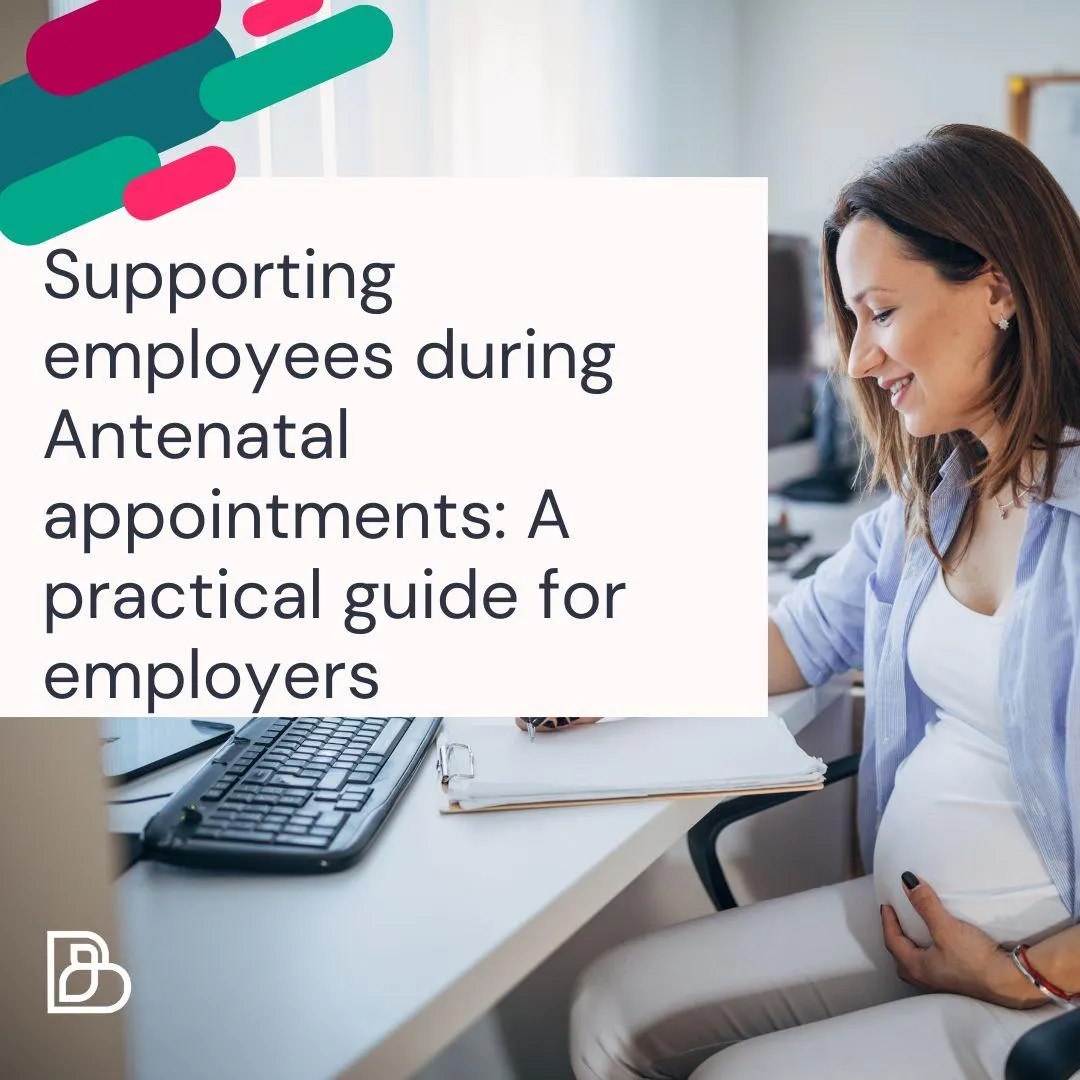Supporting employees during Antenatal appointments: A practical guide for employers
Creating a pregnancy-friendly workplace: Best practices for
supporting antenatal care at work

Businesses that actively support pregnancy and antenatal care in the workplace don’t just meet legal obligations; they build stronger teams, boost employee retention, and create a culture of inclusivity and wellbeing."
Jilly Clarke, The Birth and Baby Company
Supporting your employees through pregnancy is one of the most valuable ways to foster a caring, inclusive workplace. Pregnancy is a major life event that can significantly impact wellbeing, productivity, and job satisfaction. A workplace that proactively supports antenatal care not only ensures legal compliance but also strengthens employee loyalty, reduces absenteeism, and enhances overall business performance.
For expectant employees, antenatal appointments are a vital part of maintaining their health and their baby’s wellbeing.
As an employer, how you support these appointments speaks volumes about your company’s culture. When employees feel genuinely supported, they’re more likely to stay engaged, productive, and committed to your organisation.
Why employers supporting Antenatal care matters
Proactively supporting your employees through the antenatal period isn’t just a legal obligation; it’s a smart business strategy. Here’s why:
1. Reduced absenteeism and presenteeism
Proactive antenatal support enables employees to address health concerns early, preventing minor issues from escalating into serious conditions that lead to extended absences or reduced productivity. A literature review by the National Bureau of Economic Research highlights that benefit programs significantly influence individuals' propensity to be absent and the duration of their absences.
2. Increased retention
Employees who feel supported during pregnancy are more likely to return after parental leave, reducing turnover costs and preserving institutional knowledge. Research indicates that comprehensive parental leave policies enhance employee retention by fostering a culture of engagement and satisfaction.
3. Enhanced employer brand
Companies known for family-friendly policies attract top talent. Implementing inclusive family-friendly policies has been shown to increase employee retention, reduce absenteeism, and lower recruitment costs. weps.org
4. Increased productivity
Employees who feel supported are more engaged and productive. Addressing health concerns through workplace health promotion programs has been associated with improved productivity and reduced absenteeism. BioMed Central
5. Ethical responsibility meets business success
Investing in antenatal care fosters a positive workplace culture, enhances employee morale, and contributes to long-term business success. Supporting employees through significant life events like pregnancy demonstrates a commitment to their well-being, which in turn benefits the organisation.
A proactive approach to antenatal care is a win-win; benefiting both employees and the business. It’s not just the right thing to do; it’s good for the bottom line.
Understanding your legal responsibilities as an employer, in the antenatal period.
In the UK, pregnant employees are entitled to:
Paid time off for antenatal appointments, including scans, midwife or GP visits, and antenatal classes recommended by a healthcare professional
Protection from discrimination - employers cannot treat an employee unfairly due to pregnancy Reasonable adjustments, such as changes to workload or working hours as pregnancy progresses
Partners are entitled to unpaid time off for up to two antenatal appointments. However, many businesses go further by offering additional paid leave or flexible working to encourage greater partner involvement.
Why it makes business sense to go beyond the legal requirement
Providing additional paid leave for partners to attend antenatal appointments - particularly milestone scans and later-stage midwife and hospital visits - creates a more engaged, less stressed workforce.
When partners are actively involved in pregnancy, they experience fewer distractions at work, as they have a clearer understanding of how the pregnancy is progressing. This translates into better focus, higher job satisfaction, and increased loyalty to the company.
Expanding support through workplace education, such as The Birth and Baby Company’s antenatal courses, strengthens this further. When employees feel equipped with knowledge, they approach pregnancy, birth, and parenting with greater confidence, reducing stress and improving overall wellbeing.
Employers who invest in high-quality antenatal education create a ripple effect of positive outcomes: healthier employees, a more resilient workforce, and a company culture that truly supports families.

Protection from pregnancy discrimination: What employers need to know
Pregnancy discrimination can take many forms, from missed promotions to unhelpful attitudes from management.
Some common pitfalls include:
• Unfair treatment - Overlooking pregnant employees for opportunities or side-lining them from projects
• Lack of flexibility - Refusing reasonable adjustments, such as adjusting start times or allowing remote work when needed
• Workplace culture issues - Dismissing pregnancy-related needs or failing to create an environment where employees feel comfortable disclosing their pregnancy
To prevent this, employers should:
• Ensure all managers understand pregnancy rights and workplace adjustments
• Address inappropriate attitudes or behaviours swiftly
• Foster a culture where pregnancy is seen as part of normal working life, not an inconvenience
The Birth and Baby Company’s manager training workshops equip leadership teams with the skills to navigate these issues confidently.
Reasonable adjustments: Supporting pregnant employees
Effective pregnancy support goes beyond simply approving time off for appointments.
Employers should consider:
• Flexible working hours - Allowing employees to adjust start and finish times to suit them, to accommodate symptoms like fatigue or nausea
• Remote work options - Providing hybrid working, particularly on appointment days
• Physical workspace adaptations - Offering ergonomic seating, footrests, or standing desks
• Regular breaks - Encouraging employees to take movement breaks to prevent discomfort, and maintain a healthy pregnancy
• Temporary role adjustments - Reallocating physically demanding tasks where necessary
Some businesses go further by offering additional paid leave for pregnancy-related health needs, providing structured support through workplace pregnancy education, and ensuring managers are well-equipped to handle pregnancy conversations with sensitivity and confidence.

How employers can offer proactive support before, during, and after appointments
Before the appointment: Encourage open communication
• Start the conversation early - Let employees know they can discuss their needs without judgment. A simple question like, “How can we best support you throughout your pregnancy?” helps set a supportive tone.
• Provide clear guidance - Signpost employees to resources such as The Birth and Baby Company’s Navigating Pregnancy course, which provides expert-led education on antenatal care, decision-making, and wellbeing.
• Offer additional partner support - Consider extending paid antenatal leave to partners beyond the legal minimum. This reflects a true commitment to family wellbeing.
During the appointment: Provide flexibility
• Allow remote work where possible on appointment days
• Encourage employees to schedule appointments to suit them. Sometimes, mid-morning or early afternoon appointments can minimise waiting times and disruption
• Trust employees to manage their schedules responsibly - demonstrating flexibility builds mutual respect
After the appointment: Check-in and provide ongoing support
• Ask simple, open-ended questions such as, “Is there anything you need from us following your appointment?”
• Be responsive if additional care or temporary work adjustments are required
• Offer access to ongoing resources, such as The Birth and Baby Company’s Preparing for Birth and Postnatal Recovery courses
Providing long-term support throughout pregnancy
Sustained pregnancy support fosters an engaged and healthy workforce.
Key steps include:
• Offering flexible working options - Adjusting schedules based on health needs
• Promoting workplace wellbeing - Providing education and workshops, such as those offered by The Birth and Baby Company
• Normalising pregnancy conversations - Equipping managers to discuss pregnancy confidently and ensuring company policies align with best practices
Proactive questions to ask as an employer
To assess your company’s readiness to support pregnant employees effectively, consider:
Are managers confident in supporting pregnant employees?
Do employees have clear guidance on antenatal appointment rights?
Are flexible working options readily available?
Could offering structured antenatal education improve employee wellbeing?
Supporting antenatal appointments is one element of fostering a truly inclusive workplace. By implementing proactive policies, employers create an environment where employees feel valued and supported.
The Birth and Baby Company offers workshops, manager training, and expert-led antenatal education to help businesses become leaders in pregnancy support.
Speak with us today to explore how our resources can enhance your employee wellbeing strategy.
The Birth and Baby Company can help
Our on-demand antenatal courses, exercise videos and support programs provide expecting parents with the knowledge and confidence they need for a smooth pregnancy, birth, and transition to parenthood. Our range of packages can provide 1:1 support, regular Q&As. Crucially, all packages provide education on communication with healthcare professionals, understanding risks and options, knowledge on physically supporting themselves through pregnancy, birth and recovery, and advocating for their preferences.
Contact us today to learn how we can help your company support its most valuable asset – its people.
Home | About Us | Contact| Blog | Login | Corporate
© Copyright 2025 The Birth and Baby Company Ltd. All rights reserved. The Birth and Baby Company Limited is a limited company registered in England and Wales.
Company Registration Number: 15655287 | Our registered address is: 27 Wilshere Road, Welwyn, Hertfordshire, AL6 9PU
Privacy Policy | Terms & Conditions | Medical Disclaimer | Inclusivity & Accessibility
